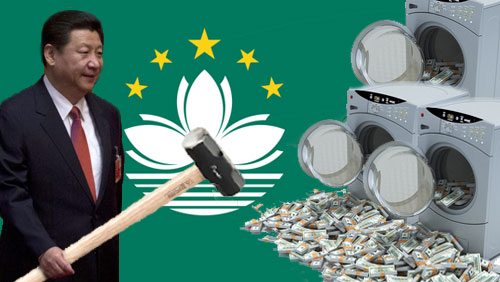 China’s central bank has signed a pact with Macau’s financial regulators to bolster cross-border anti-money laundering measures.
China’s central bank has signed a pact with Macau’s financial regulators to bolster cross-border anti-money laundering measures.
In a notice on its website, the People’s Bank of China (PBC) announced on Friday without elaboration that it has signed a memorandum of understanding with the Macau Monetary Authority on bilateral exchanges on anti-money laundering regulations, information exchange mechanisms and on-site inspections.
The PBC also said that the mainland and Macau would adopt recommendations from a global anti-money-laundering body, the Financial Action Task Force, to toughen regional supervision against money laundering.
The agreement is the latest move in Beijing’s wider anti-graft drive, as Macau casinos have been considered a money laundering blackspot. Macau’s junket operators and high roller VIP industry have also come under increased scrutiny from authorities due to Chinese President Xi Jinping’s campaign to crack down on corruption and illicit transactions.
There is also speculation that a similar agreement is in the works for Hong Kong as Macau casino junket figure Cheung Chi-tai has been the focus of a lengthy police investigation for allegedly laundering HKD1.8 billion ($232m) through his bank accounts in Hong Kong.
“Although we don’t have all the details, taken in the context of what has gone on over the past year or so, the problem here seems not to be about taking away power from Macau bodies but rather giving the Chinese authorities unhindered access to information,” a finance industry insider told the Sunday Morning Post. “Are we an autonomous entity, or not? If Macau is, then we should provide such information as Beijing wants subject to Macau laws, not, as appears to be the case here, through a memorandum of understanding.”
Bernstein Research said that the recent agreement will bring Macau’s banking system in greater compliance with global AML standards and could further hurt Macau’s VIP business.
“A tightened control on capital flow may dampen small and medium junkets’ (and their VIP customers’) ability to move money out of China. As a consequence, we expect the consolidation in the junket industry to continue,” said analyst Vitaly Umansky in a note. “It is our understanding that these junkets may currently be employing Macau’s banking system to facilitate money transfers to/from these foreign jurisdictions. Such activities may likely now be under greater scrutiny resulting in more risk/concern associated with shifting VIP business from Macau to foreign jurisdictions.”